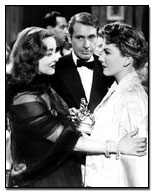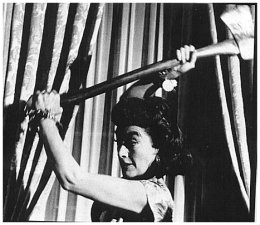
Like the Bionic Woman Doll, Pop Rocks, and Bicentennial memorabilia, Academic Mentoring has seemingly gone the way of the loon. Some of us who are extraordinarily lucky or shrewd enough (see Fine Young Cannibals, below) are taken under the wing of a sympathetic and wise older faculty member and taught the tools and tricks of the trade. The rest of us, like Hollywood starlets, have to claw our way to success or die trying. It seems, in the not-too-distant past, that mentoring wasn’t such a rare commodity. White men taught and then hired the same white men, only younger, and everything went smoothly. An army of identical white men, badly dressed in khakis, button-down shirts, and cordovans marched across American academe, seducing bewitched co-eds and enjoying early tenure without peer review, much less a book. Did mentoring start to break down when the doors of the university opened to the rest of us? Or was it the general increase in American society of unpleasantness and the concomitant rise in social misanthropy? I suppose we could debate this issue all day long, but suffice it to say mentoring in the classic sense has become as rare as a first edition of Beardsley’s Yellow Book, and just as valuable.
Few if any graduate students nowadays are given the proper education on collegiality, institutional politics, developing and using networks, readings signs and symbols, and other arts of self-preservation. Oh, sure, we know how to write books and articles, cite appropriately, teach (more or less), and how to get into cat fights on the seminar room floor. But what good are those skills in negotiating quotidian life as a junior professor? Not much. Sometimes it seems they can even count against you, if you aren't appropriately modest (or alternatively, wondering if this is a moment for self-puffery rather than demuring; always hard to tell). What I lacked was someone, a faculty member, in graduate school teaching me these things. I've had to learn them the old-fashioned way: Miss School of Hard Knocks! Talk about on the job training!
In this business, the hits come left, right, and below the belt. Also, I might add, this girl had her ass kicked at her last job because she was too frank with her (often correct, but still) opinion on matters pertaining to her department. I would like to cultivate a Sphinx-like outer calm, but I’m too much of a chismosa for that. This girl loves her some dish! And as every saucy girl and boy knows, you gots to give to get in the business of information exchange and cultivation. I just wish more people could express themselves in a clear, obvious prose when it counts, as in: “If you don’t do this, I’m gonna see that you lose your job.” Now that’s a statement most girls and boys would pay close attention to, as opposed to something else like, “I think the work has a strong basis, and here are my suggestions…” Sorry, but most of the time I can’t hear dog whistles.
At my last job at Sadistic College, I was done in by my senior mentor/chair, who in the end didn’t mentor at all, but did educate. She was the one who taught me that every banal utterance has an ulterior meaning. She’s the one who taught me to listen for the dog whistle. This person and others makes me think of the tensions between people of colour (Black/Brown/Red/Yellow tensions) and between academic generations and between straight people and LGBT people and between men and women. These social and cultural distinctions and divisions come to bear an inordinate weight in the mentoring relationship, and also become in short order, grace à the social movements of the 1960s, politicized and polemic in ways that perhaps they cannot sustain.
For instance, we inherit a vague vibration from the 1960s: “each one teach one,” “lift as you climb,” “¡Si se puede!” and a host of other slogans about mentoring, support, and achieving success. And some of us still believe, in principle, in these sentiments, because they are a) still important, and b) speak to the power of common experience in organizing sympathies and empathies. But as we move farther from 1965 when formal white supremacy ends in this country, common experience has become more problematic, probed and prodded and dissected on the academic level, and falling apart in mainstream society as constituencies are split along class, race, colour, and sexual lines, among a host of possible divisions. Reason A remains crucial, certainly to anyone looking at rates of retention and graduation for Black and Latino students from K-12 to doctoral and professional education. Fourty years after the Civil Rights Movement, we are still not there. Reason B, however, has become more distant and theoretical than material.
It is also clear that simple sloganeering won’t suffice in an age of increased competition and institutional viciousness as the academia spirals down into the beginning of the death throes of its current incarnation. Or to put it another way, as my girlfriend M says, “It’s never the person of colour that supports you, it’s always the creepy white guy.” This commentary strikes me as sad but also as remarkably prescient. Not because its bad that creepy white guys are now able to offer (perhaps creepy) non-white guys (and gals) support, I mean, Hooray! for creepy white guys, but rather that the fantasies about community support and communal sustenance have gone missing. And many times those of us who still attempt to live by these dictums of solidarity are punished again and again. The signifier of the person of colour (or LGBT, or woman, or whatever) has become completely unhinged from the referent, and now we bring (as we always have, really) qualifications and measurements to bear upon colleagues who do or do not meet our often intensely personal and subjective ideas of what is appropriately raced, sexualized, or gendered behaviour and political persuasion. We tend, as communities in the academy, to viciously police each other in ways that remind many of us depressingly of white supremacist values. Except now the white power structure doesn’t need to do it itself, it’s outsourced that work to people of colour themselves. The slave values we have inherited from our history as a brutalistic and violent white supremacist society we now use with élan and a bit of flair. This is really an old-school remix, but humour me a bit here. Because unlike the old school, Paulo Freire and bell hooks and others of their ilk, I don’t think there is any holistic healing we can achieve, no complete person lying beneath the wreckage and damage, no happy American endings to this drama of terror. The best we can hope to do is to survive, and attempt to do so as humanely and ethically as possible, with ourselves and with others. As Miss Gloria says, Baby, I will survive!
I would like to think that if I decide to stay in the profession, and the profession remains somewhat in its current form for at least awhile, I will become the mentor I wish I had in graduate school, one who advises and warns clearly and explicitly, who can maintain a professional grace, and who can empathize with different experiences and knowledges across racial, gendered, and sexual boundaries. This is who I am. I’m just not sure there’s room for this model in our profession. Vamos a ver… Now, girls, I’ve got to go give an exam!




3 comments:
It’s funny – And by funny, I mean soul-crushing – The lack of support from within Latino Studies is what surprised me the most about leaving graduate school. I mean, I didn’t expect Miltary Historians to be supporting my ass. Latino scholars, though, I imagined would be out in force.
Though naïve, I expected that all my fellow Latinos and Latinas had a shared mission in bringing forth the knowledge of our past. Turns out that most of them are just like every other academic: They want tenure; they look to network only with “important” people; and they will step over your dismembered [academic] body to get their own book published. **sigh**
Good Luck grading said exams.
I love your blog, which I just came across today! You really capture the crap of academia. One little critique that I have is your paragraphs are quite long for reading on a computer screen. Anyway you could chunk them up a bit? Would make things a little easier on the eyes. Other than that, just wonderful! Wonderful!
It's good to see that you are willing to be that mentor to others. Where as the ones who were supposed to be your mentors didn't. women mentoring helped me get a balance on work and life!
Post a Comment